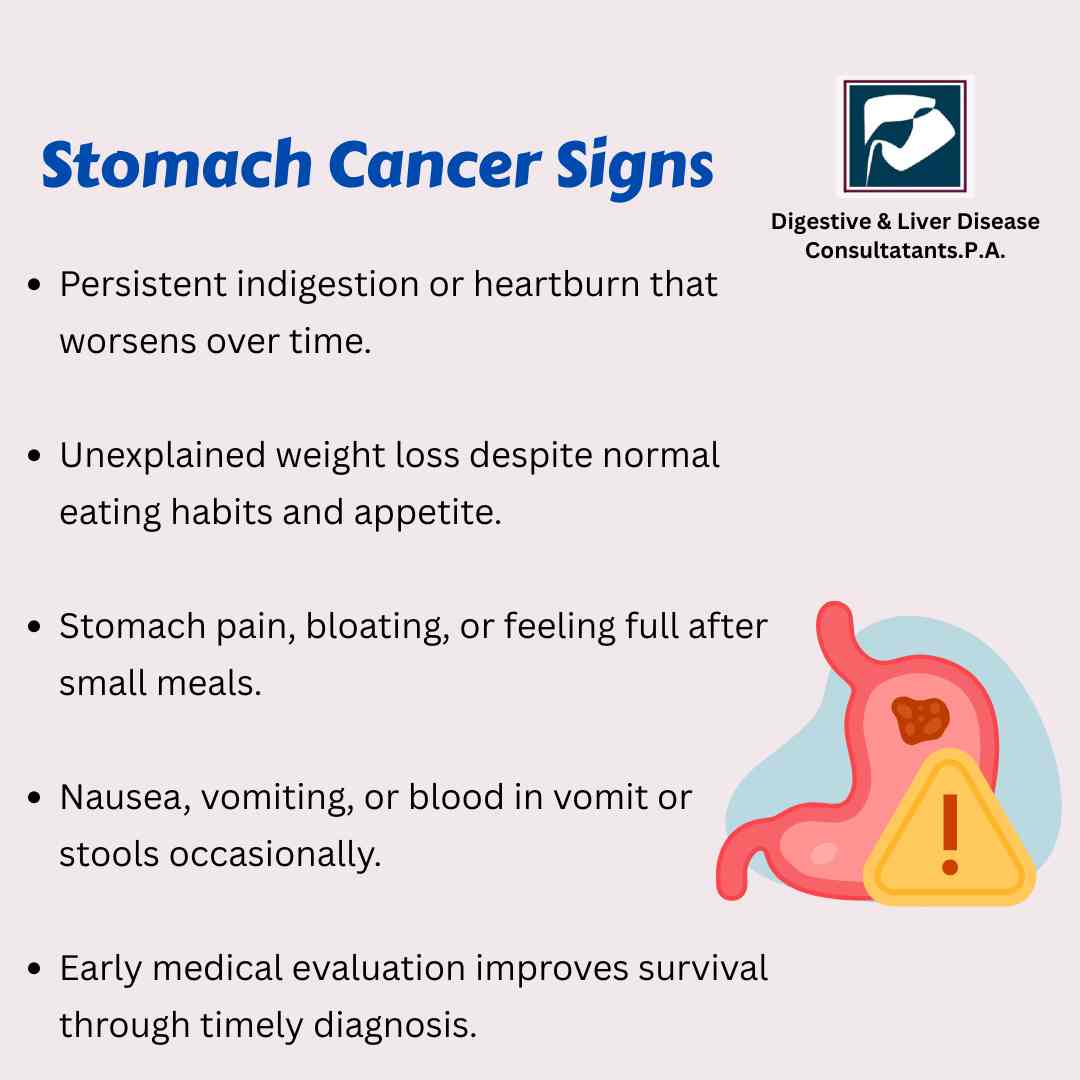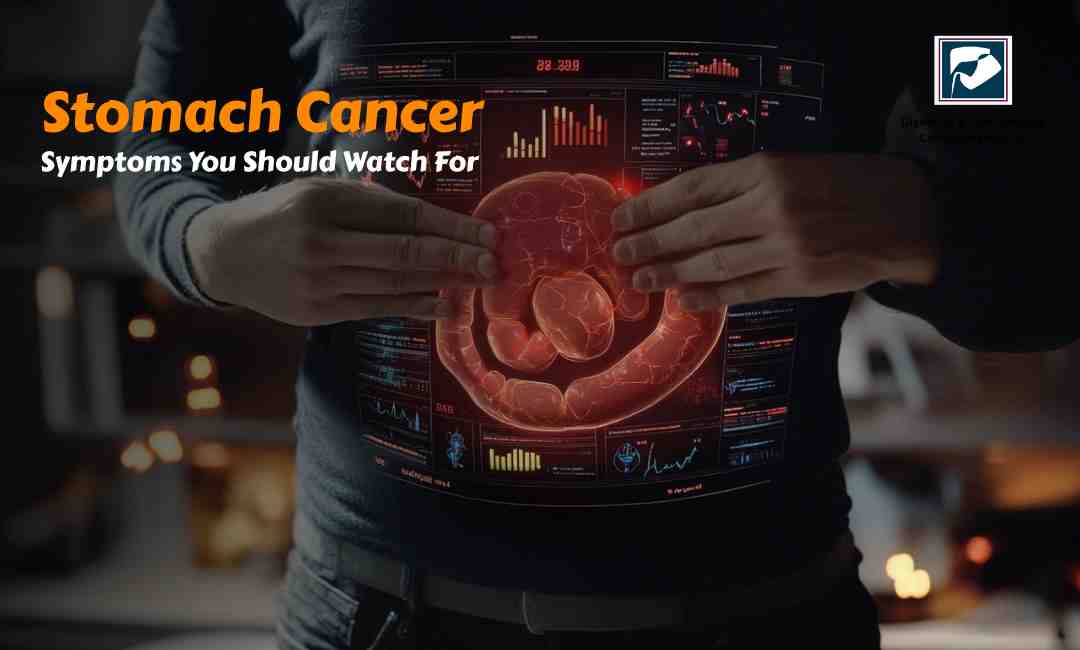Stomach cancer doesn’t usually shout for attention. It starts quietly, hides behind common digestive issues, and slowly progresses. That’s why many people miss the early signs. But here’s the thing. When you know what to look for, you’re already one step ahead. Early detection gives you a far better chance at successful treatment.
What Stomach Cancer Actually Is
Your stomach’s job is pretty straightforward. It receives food, breaks it down, and passes it on to the intestines. Cancer begins when some cells in the stomach start growing out of control. Over time, these cells can form a tumor. Some grow slowly. Some grow quickly. And most start with symptoms that feel like regular digestive problems, which is why people often ignore them.
What this really means is that paying attention to persistent changes is the key.
Common Early Symptoms You Should Not Ignore
Early stomach cancer doesn’t cause dramatic symptoms. Instead, it shows up as subtle changes like:
1. Ongoing indigestion
If bloating, burning, or discomfort in the upper abdomen becomes your everyday experience, don’t brush it off. Occasional acidity is normal. Acidity that keeps returning is not.
2. Feeling full very quickly
If you feel stuffed after a few bites of food, something is off. Tumors can limit the stomach’s space or slow its movement, making you feel full far too early.
3. Mild but persistent stomach pain
A dull ache in the upper stomach area that lasts for days or weeks deserves attention. This pain may not be severe but tends to linger.
4. Nausea that keeps coming back
Everyone feels nauseous once in a while. But repeated nausea or vomiting without a clear reason needs a check.
5. Unexplained weight loss
If the weight drops without changes in diet or activity, your body may be signaling a deeper issue. Stomach cancer can impact appetite and metabolism.
6. Low appetite
Losing interest in food, especially if this is new for you, may be an early sign.
7. Heartburn that doesn’t settle
Chronic heartburn or discomfort after eating can indicate irritation in the stomach lining.
These symptoms don’t always mean cancer. They can result from ulcers, gastritis, infections, or acid reflux. But the key point is consistency. If the symptoms stay for more than two to three weeks, it’s time to talk to a specialist.

Advanced Symptoms That Need Immediate Attention
As stomach cancer grows, symptoms become more noticeable. Watch out for:
1. Difficulty swallowing
If food feels stuck or painful while swallowing, the tumor might be blocking part of the stomach.
2. Vomiting blood or black colored vomit
This is a serious warning sign of internal bleeding.
3. Black, tar like stools
This also indicates bleeding inside the digestive tract.
4. Severe fatigue
Ongoing blood loss or nutritional deficiency can drain your energy.
5. Swelling in the abdomen
Fluid buildup around the stomach can cause abdominal swelling and discomfort.
These are not symptoms you wait on. They require immediate medical help.
Why Stomach Cancer Symptoms Are Often Missed?
Here’s the tricky part. Stomach cancer symptoms overlap heavily with common digestive issues. Many people think it’s just acidity, food poisoning, stress, or age related digestion problems. Some get temporary relief with home remedies or antacids and feel the problem is gone. But the underlying issue may continue to grow quietly.
This is why awareness matters. Consistent symptoms are the biggest clue your body gives you.
Who Is More Likely To Develop Stomach Cancer?
Some people have a higher risk due to lifestyle or medical factors. For example:
- Regular smoking
- Diets high in salty, smoked, or processed foods
- Long term H. pylori infection
- Family history of stomach cancer
- Chronic stomach inflammation
- Obesity
- Previous stomach surgery
- Heavy alcohol use
If you fall into one or more of these categories, you need to be extra alert to symptoms.
How Doctors Diagnose Stomach Cancer?
If you walk into DLDC with symptoms, the goal is simple. Find out what’s causing them. The team usually begins with a detailed discussion of your symptoms, followed by tests like:
Endoscopy
A thin tube with a camera lets the doctor look directly at the stomach lining. This is the most accurate way to detect early changes.
Biopsy
During endoscopy, the doctor may collect small tissue samples to confirm if cancer cells are present.
Ultrasound or CT scan
These tests help understand the size and spread of the tumor, if present.
Blood tests
These check for anemia or other abnormalities.
The process is smooth, and most people tolerate it well. What matters is that it gives a clear picture of what’s happening inside your stomach.
Treatment Options If Cancer Is Found
Treatment depends on the stage of cancer and your overall health. The aim is always to remove the tumor, slow its growth, or relieve symptoms.
Surgery
If the cancer is caught early, removing part or all of the stomach may completely eliminate it.
Endoscopic treatments
For very early stage cancers, doctors may remove small tumors through endoscopy without major surgery.
Chemotherapy
This helps shrink the tumor or destroy remaining cancer cells after surgery.
Targeted therapy
These medicines attack specific cancer cells while sparing healthy ones.
Radiation therapy
Sometimes used with chemotherapy to improve outcomes.
At DLDC, the goal is to offer treatment plans that are personalized, evidence backed, and built around the patient’s comfort and long term health.
What You Can Do To Reduce Your Risk
You can’t control everything, but you can reduce risk significantly with simple habits.
- Eat more fruits, vegetables, and whole foods
- Limit smoked, salty, and processed foods
- Quit smoking
- Manage weight
- Reduce alcohol
- Treat H. pylori infections early
- Stay physically active
Small steps stack up over time.
When You Should See a Doctor
Here’s the simplest rule. If any stomach related symptom lasts more than two weeks and keeps coming back, check with a gastroenterologist. It’s always better to get checked early than to wait for symptoms to worsen.
DLDC specialists handle complex digestive issues every day. Whether it’s a mild symptom or a concerning change, their team knows exactly how to evaluate it and guide you forward.
Why Choose DLDC Clinic?
People trust DLDC because they focus on expertise, accurate diagnosis, and patient comfort. Their gastroenterologists are highly experienced in identifying early stomach problems, including cancer, using advanced diagnostic tools. They take time to understand your symptoms, explain the next steps clearly, and offer treatments that align with your needs.
If you're dealing with persistent digestive issues or concerned about symptoms, the safest step is to get evaluated early.
Conclusion
Stomach cancer doesn’t start with dramatic warning signs. It starts small. Listening to your body, spotting persistent symptoms, and taking early action can make all the difference. If you’re noticing ongoing issues with digestion, appetite, or unexplained changes in your health, don’t wait.
Reach out to our best gastroenterologist at Digestive and Liver Disease Consultants, P.A. They’re here to help you understand what’s going on and guide you toward the right treatment.






